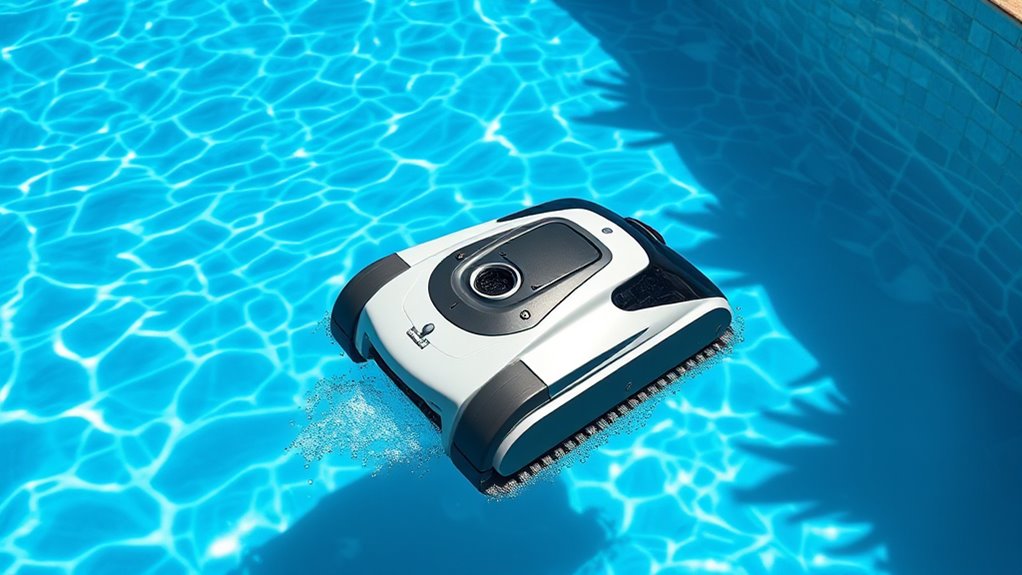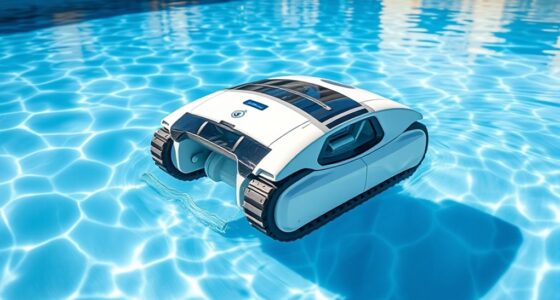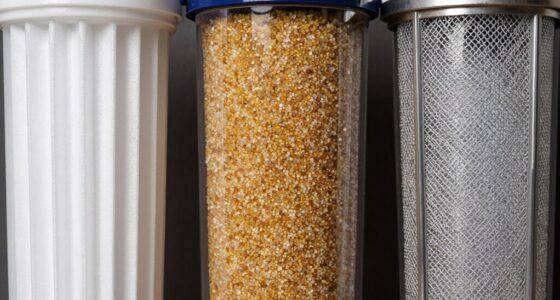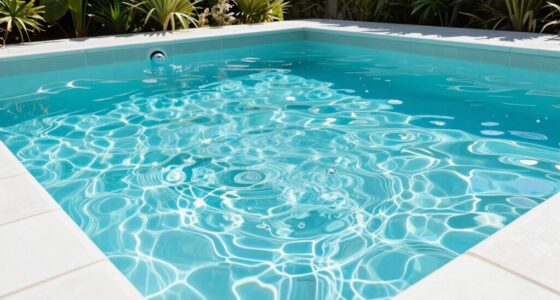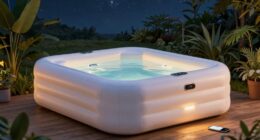Automatic pool cleaners usually last between 3 and 7 years, depending on their type, usage, and how well you maintain them. Robotic models tend to last 5-7 years, while pressure-side and suction cleaners may last 3-5 years. Proper cleaning, storage, and avoiding harsh chemicals can extend their lifespan. If you want to know more about how to get the most out of your cleaner and when to replace it, keep going.
Key Takeaways
- Robotic pool cleaners typically last 5 to 7 years with proper maintenance.
- Pressure-side and suction models usually have a lifespan of 3 to 5 years.
- Regular cleaning, water chemistry management, and part replacement extend device longevity.
- Harsh chemicals and sun exposure can reduce the lifespan of pool cleaners.
- Proper storage and routine inspections help maximize the operational years of automatic cleaners.
Types of Automatic Pool Cleaners and Their Expected Durability
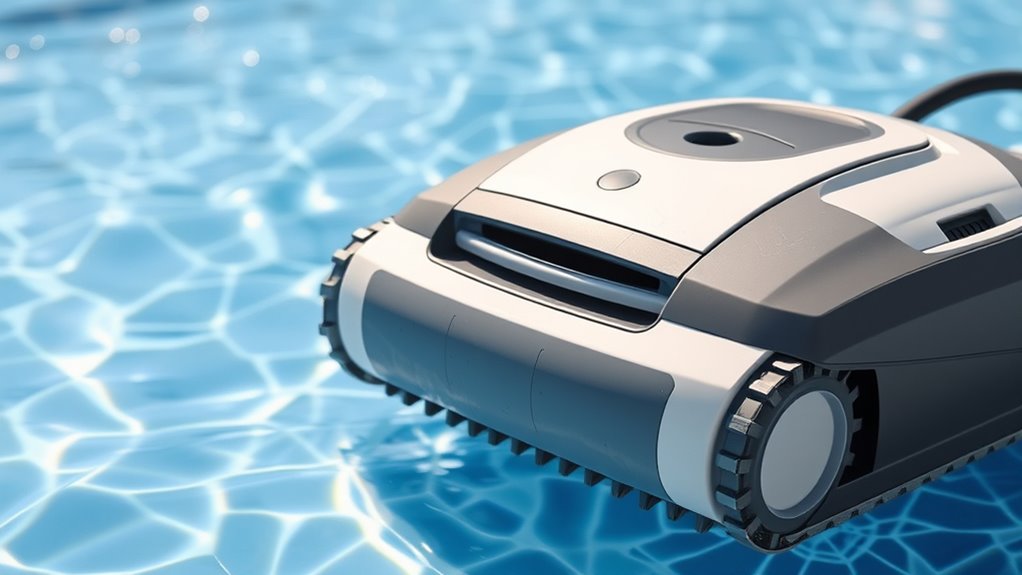
Have you ever wondered how long your automatic pool cleaner will last? The type you choose plays a big role in its durability. Robotic cleaners typically last 5 to 7 years with proper pool maintenance and good water chemistry. They’re built with durable parts that resist corrosion, but their motors can wear out over time. Corrosion resistance is a key factor in extending their lifespan. Regularly checking and replacing worn parts can further improve their longevity. Pressure-side cleaners, which use the pool’s pump, usually last around 3 to 5 years, depending on water chemistry and how well you maintain your pool’s filters. Pool maintenance routines that include cleaning filters and monitoring water quality can help prolong the life of your cleaner. Additionally, understanding family background can provide insights into how personal factors might influence pool maintenance routines. Moreover, selecting a cleaner with high-quality water-resistant components can significantly impact its longevity and performance over time. Proper cleaner maintenance and prompt repairs can also help maximize the lifespan of your automatic pool cleaner.
Factors Influencing the Lifespan of Pool Cleaners
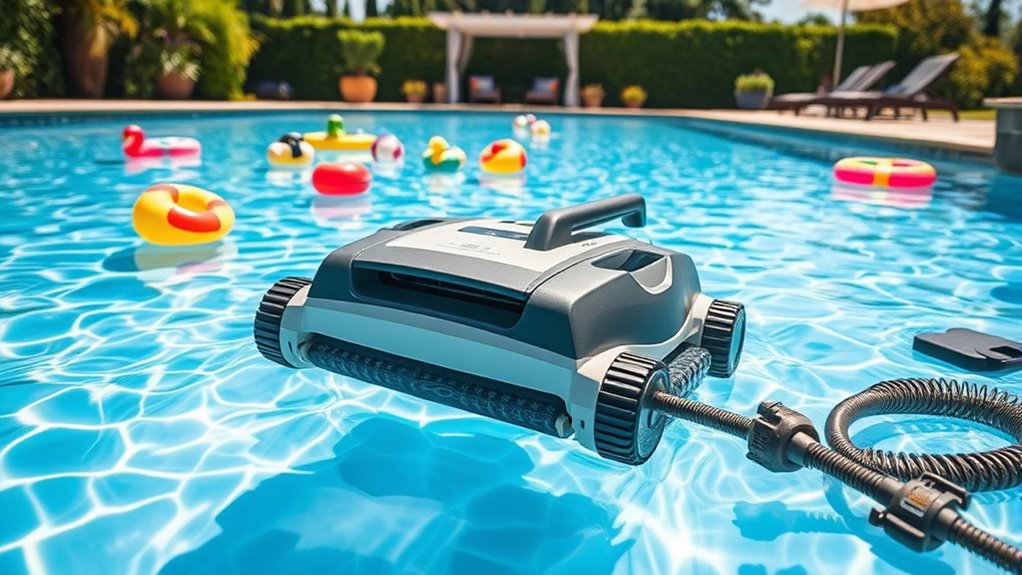
Several factors can considerably impact how long your pool cleaner lasts. Pool chemicals, like chlorine and algaecides, can cause wear and tear on the cleaner’s components if not properly balanced. Harsh chemicals may degrade seals, belts, and brushes over time. Sun exposure also plays a significant role; prolonged exposure to UV rays can weaken plastic parts, making them brittle and prone to cracking. Additionally, outdoor placement without shade accelerates deterioration. Proper storage, especially during off-season months, protects it from sun damage and unnecessary wear. Regular maintenance, such as rinsing after use and avoiding harsh chemicals, helps extend your cleaner’s lifespan. Using high-quality replacement parts can also significantly improve durability and performance. For added protection, consider using UV-resistant materials in your pool cleaner’s construction to withstand prolonged sun exposure. Proper storage, especially during off-season months, protects it from sun damage and unnecessary wear. Routine inspections and timely repairs are essential in preventing minor issues from becoming major failures, thus extending the lifespan of your pool cleaner. Additionally, choosing a model with advanced durability features can further enhance its longevity. According to the best arcade machines for home game rooms, managing these factors can ensure your pool cleaner remains functional and efficient for as long as possible.
Average Lifespan of Robotic, Pressure, and Suction Models

Robotic, pressure, and suction pool cleaners each have typical lifespans that vary based on usage and maintenance, but generally, you can expect them to last between 3 to 7 years. Proper maintenance routines can extend their longevity, ensuring parts stay in good condition and reducing the likelihood of breakdowns. Additionally, warranty coverage plays a crucial role; many models come with warranties that protect against early failures, giving you peace of mind. To maximize lifespan, keep these factors in mind:
- Regularly clean and inspect components to prevent wear and tear.
- Follow manufacturer instructions for maintenance routines.
- Understand warranty coverage to address potential repairs or replacements.
- Staying informed about product durability can help you make better purchasing and maintenance decisions. Routine upkeep and understanding repair options are key to getting the most out of your robotic, pressure, or suction pool cleaner. Proper storage and proper operation can also significantly impact their lifespan. With proper care, you can get the most out of your investment over several seasons.
Tips for Maximizing the Longevity of Your Pool Cleaner
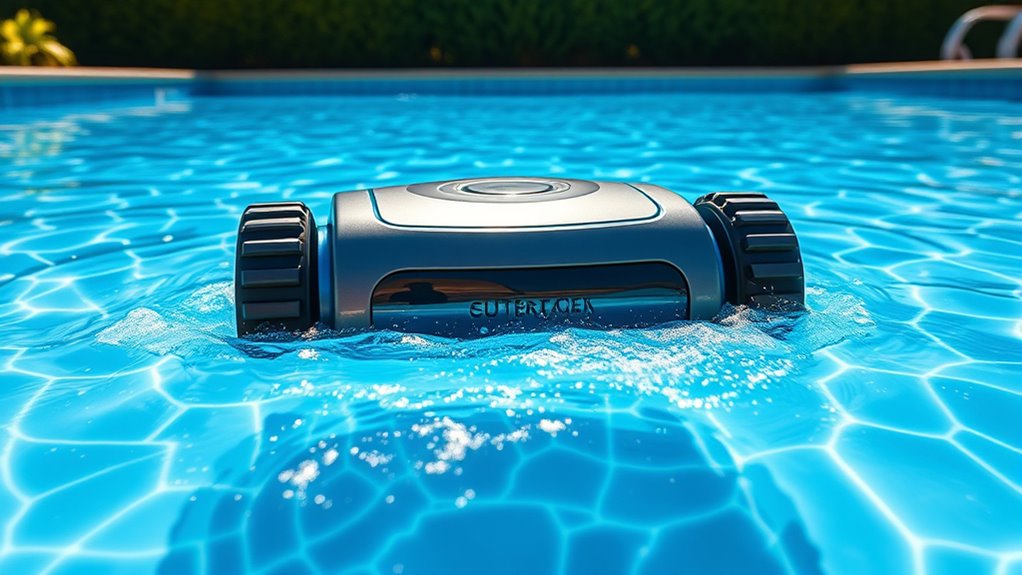
To get the most out of your pool cleaner, you should regularly clean its filters and check for any blockages that could hinder performance. Properly storing your cleaner during the off-season also helps prevent damage and wear. Proper maintenance practices can markedly extend the lifespan of your device and keep it working efficiently. Additionally, maintaining a clean and organized workspace ensures that you can easily access and perform routine maintenance on your pool cleaner, further enhancing its durability. Regularly inspecting and replacing wear and tear components can prevent unnecessary wear and breakdowns. Being aware of privacy policies related to your devices can also help you understand how data collection might impact your smart pool equipment.
Regularly Clean Filters
Regularly cleaning your pool cleaner’s filters is essential to keep it running efficiently and extend its lifespan. Dirty filters can reduce suction power and strain the motor, leading to quicker wear. To maximize your cleaner’s longevity, consider these steps:
- Inspect and rinse filters after each use, removing debris and buildup.
- Ensure your pool’s chemical balance is maintained, preventing algae and mineral deposits that can clog filters.
- Keep your pool liner well-maintained, as rough or damaged liners can introduce debris that clogs filters faster.
- Incorporate proper maintenance routines to further prevent filter issues and prolong the life of your pool cleaner.
- Regularly check the filter material, as worn or damaged filters may need replacement to ensure optimal performance.
- Additionally, using advanced filtration technology can help reduce filter clogging and extend intervals between cleanings.
- Periodically review the manufacturer’s guidelines for your specific pool cleaner model to ensure proper care and troubleshooting.
- Staying informed about AI in Business applications can lead to innovative maintenance solutions that enhance efficiency and predictive care.
Check for Blockages
Since blockages can substantially impair your pool cleaner’s performance, it’s important to check for obstructions regularly. Debris like leaves, twigs, or dirt can clog the brushes or hoses, reducing efficiency and putting extra strain on the motor. Also, keep an eye out for algae buildup, which can stick to the cleaner’s parts and cause blockages. A chemical imbalance in your pool can promote algae growth, making it more likely to clog your cleaner over time. Regularly inspect and clear any debris or buildup to ensure smooth operation. Maintaining a clean, balanced pool not only prevents blockages but also extends your cleaner’s lifespan. Proper maintenance and vetted equipment can help prevent unexpected breakdowns, ensuring your cleaner lasts longer and performs optimally. Consistent checks help your cleaner work efficiently and last longer, saving you money in the long run. Additionally, using appropriate cleaning tools can aid in removing stubborn debris and keeping the cleaner’s components in top condition. Regularly monitoring and maintaining your pool’s filtration system can further improve cleaner performance and longevity.
Store Properly During Off-Season
Proper storage during the off-season is essential for maintaining your pool cleaner’s longevity. Proper off season maintenance and storage tips prevent damage and ensure it’s ready for use when swimming season resumes. First, clean the cleaner thoroughly, removing debris and rinsing off any dirt. Second, store it in a cool, dry place away from direct sunlight to prevent material degradation. Finally, check the brushes, filters, and cords for wear and replace parts if needed before storage. Keep the cleaner in an upright or flat position to avoid unnecessary stress on components. By following these storage tips, you’ll extend your pool cleaner’s lifespan and ensure it operates smoothly next season. Proper off season maintenance is a simple step that pays off long-term.
Signs Indicating It’s Time to Replace Your Pool Cleaner
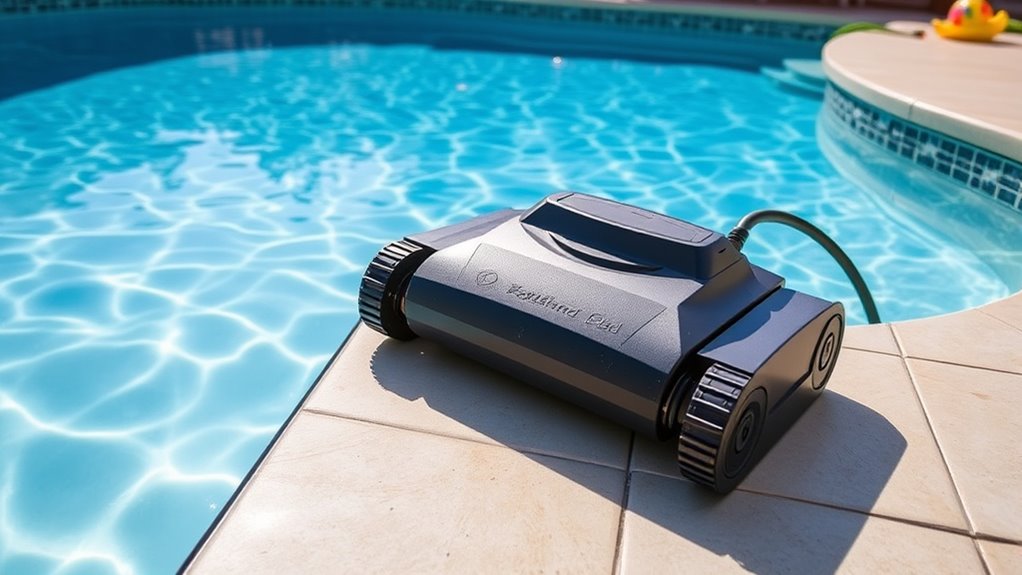
When your pool cleaner starts to underperform despite routine maintenance, it’s a clear sign that it may be time for a replacement. If you notice it’s missing spots or taking longer to clean, your device may be losing efficiency. Diminished cleaning ability can also indicate worn brushes or clogged filters, which impact overall pool maintenance. Additionally, if your cleaner uses more energy than usual, it’s a sign that it’s no longer operating efficiently. Increased energy consumption not only raises costs but also signals declining energy efficiency. Strange noises or frequent breakdowns are further indicators that your cleaner’s lifespan is ending. Recognizing these signs early helps you avoid costly repairs and ensures your pool remains clean and well-maintained.
Cost Considerations for Repairs and Replacements
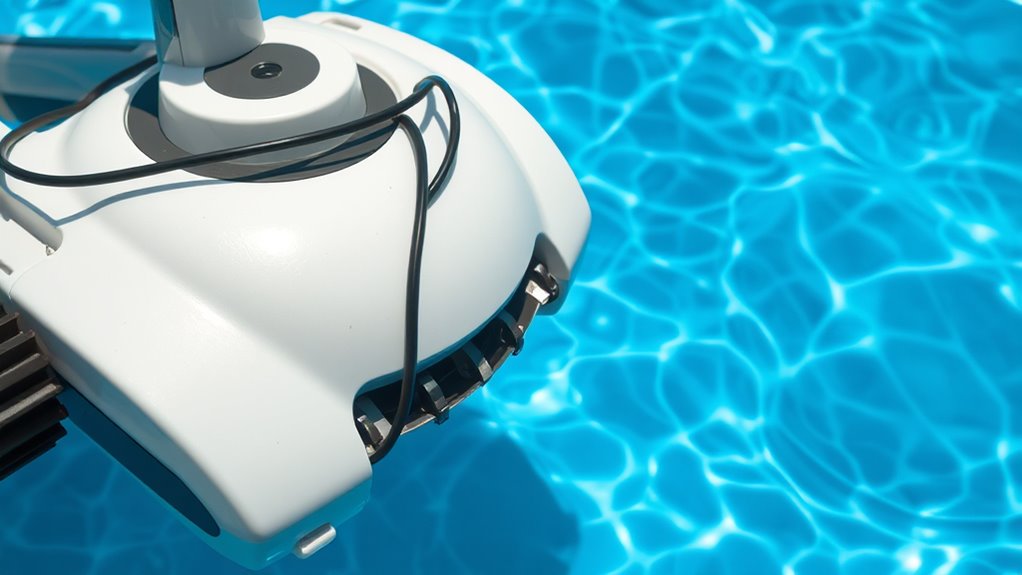
Evaluating the costs of repairing or replacing your pool cleaner involves understanding both immediate expenses and long-term savings. You should consider how repairs impact ongoing pool maintenance and energy efficiency. Cost factors include:
Assessing repair and replacement costs helps optimize pool maintenance and energy savings over time.
- Repair costs: Fixing common issues like worn brushes or motor problems can be affordable but may add up over time.
- Replacement parts: Upgrading to more energy-efficient components can reduce long-term energy bills.
- Full replacement: Sometimes, replacing the entire cleaner is more cost-effective, especially if repairs become frequent, impacting your pool maintenance budget.
Investing in a model with better energy efficiency can lower operating costs, making repairs more manageable and prolonging your cleaner’s lifespan. Balancing these factors helps you make smarter financial decisions.
Frequently Asked Questions
How Often Should I Perform Maintenance on My Pool Cleaner?
You should perform maintenance on your pool cleaner regularly to guarantee ideal performance. Follow a consistent maintenance schedule, checking for debris, wear, and tear weekly. Clean the filter and brushes, and inspect hoses for damage. Proper upkeep extends your pool cleaner’s lifespan, preventing costly repairs. Typically, a well-maintained automatic pool cleaner can last several years, but neglecting maintenance reduces its lifespan considerably. Stay proactive to keep your cleaner running smoothly.
Can Improper Storage Affect the Lifespan of My Pool Cleaner?
Improper storage conditions can definitely impact your pool cleaner’s lifespan. If you don’t store it properly, exposure to extreme temperatures, sunlight, or moisture can cause damage. Make sure to clean it regularly and store it in a cool, dry place when not in use. This helps prevent deterioration and keeps it functioning efficiently. Proper storage and consistent cleaning frequency are key to extending your pool cleaner’s durability.
Are There Specific Brands Known for Longer-Lasting Pool Cleaners?
You might think all pool cleaner brands last equally, but some stand out. Popular brands with a strong reputation often offer models with better durability, thanks to quality materials and design. When choosing, look for reviews highlighting model durability and brand reliability. While no cleaner lasts forever, investing in trusted brands can extend the lifespan of your automatic pool cleaner, saving you money and hassle over time.
How Does Water Chemistry Impact the Durability of Pool Cleaners?
Water chemistry greatly impacts your pool cleaner’s durability. If water pH levels are too high or low, it can cause wear and tear on your cleaner’s components. Maintaining proper chemical balance prevents corrosion and buildup that shorten its lifespan. Regularly test and adjust your pool’s water pH and chemicals to guarantee your automatic pool cleaner stays in good condition and lasts as long as possible.
What Are Common Troubleshooting Steps to Extend Lifespan?
Think of your pool cleaner as a trusted companion on a long journey. To extend its lifespan, regularly perform filter replacement to keep it running smoothly and check brushes for wear, replacing them when needed. Keep an eye on the tracks and wheels, ensuring they’re clean and free of debris. Proper maintenance prevents breakdowns, helping your cleaner stay loyal and efficient for many seasons to come.
Conclusion
If your pool cleaner struggles to pick up debris or keeps breaking down, it might be time to substitute it. For example, imagine spending hundreds on repairs only to find your robot still won’t clean properly—you’re better off investing in a new model. Regular maintenance and attention to signs of wear can extend its life, but knowing when to upgrade ensures your pool stays spotless without unnecessary costs. Keep an eye on performance, and your cleaner will serve you well longer.
